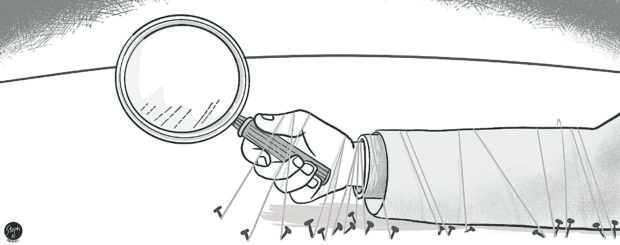No ‘national security’ risk

Two significant developments have happened at the Philippine National Police since Gen. Guillermo Eleazar assumed office as chief of the 220,000-strong police force.
First, Eleazar allowed the Department of Justice to have access to select records of the so-called “nanlaban’’ deaths in police anti-drug war operations.
Then, last Friday, Eleazar finally launched the use of police body cameras in a bid to make police operations transparent and prevent accusations of killings and abuses that have dogged past drug raids.
“Today, the Filipino people will finally have the eyes and ears in law enforcement and in the implementation of peace and order in the country,” Eleazar said at the launch.
The use of body cameras in police operations was proposed four years ago amid public outrage over the killing of 17-year-old Kian delos Santos by Caloocan cops in 2017. The police claimed Delos Santos was shot as he fought back during a drug raid, but CCTV footage showed he was mercilessly gunned down by the police while kneeling and begging for his life.
“The procurement and eventually the use of body cameras is a tribute not only to Kian delos Santos who died of police abuse in Caloocan City, but also to the policemen whose ultimate sacrifice in the line of duty were tainted by extrajudicial killings, planting of evidence, and other unfair allegations,” Eleazar said. Kudos to him for acknowledging that police wrongdoing was indeed behind the death of Delos Santos, something the PNP chief at the time, now Sen. Bato dela Rosa, vehemently denied despite clear evidence to the contrary.
The PNP has distributed 2,696 body cameras to 171 police units, and is looking to acquire an additional 30,000 units. The body cams will be used in anti-drug operations, the service of warrants, and other sensitive security operations. Apart from the thousands killed in drug operations over the past five years, the police have also been accused of planting evidence and killing subjects while supposedly serving warrants against drug suspects and members of militant organizations.
Disturbed by the irregularities in the serving of warrants, the Supreme Court last March pushed to require the police to wear body cameras in its operations.
While the PNP has started to deploy the technology, there is still a lot to be done to make the system work. Only 600 cops have been trained to use the gadgets at this time. The guidelines have yet to be finalized and are pending with the Supreme Court after the draft was submitted to it for review on June 2.
Nevertheless, this and Eleazar’s move to open the drug war records to the DOJ inquiry could only do the PNP good, by helping restore some semblance of probity and professionalism to its badly tarnished image. Unfortunately, no sooner had Eleazar announced this welcome new direction than a monkey wrench was thrown at his initiative. President Duterte himself publicly opposed releasing the police records, invoking “national security.”
The government cannot disclose these records as they contain confidential information about certain personalities, said the President: “We have records that those who have died, but who have derogatory records in our files, and may have references to certain people and what they do, we cannot divulge it to anybody but only to the military and to the police.”
But the Supreme Court has already ruled that there are no national security implications in disclosing the drug war records. In April 2018, it rejected that position by the Solicitor General, who had refused to submit the PNP investigation reports on the 3,806 individuals killed in police drug operations from July 1, 2016 to Nov. 30, 2017.
“These information and documents do not involve rebellion, invasion, terrorism, espionage, infringement of our sovereignty or sovereign rights by foreign powers, or any military, diplomatic or state secret involving national security,” declared the Court. It added that the information being sought only covered “routine police operations,” and that the PNP “cannot claim presumption of regularity in official functions because deaths are not supposed to occur during any of their operations.”
The President’s reflex move to slap down any scrutiny of the consequences of his brutal drug war not only runs counter to the new policy of transparency and accountability — however limited or even token at this late point — being pursued by the PNP chief and the justice secretary. In the end, and on a more consequential level, such presidential stonewalling will likely render the investigation dead even before it has begun, which could only bolster the charges of impunity that have been leveled against this administration before the international courts.
















